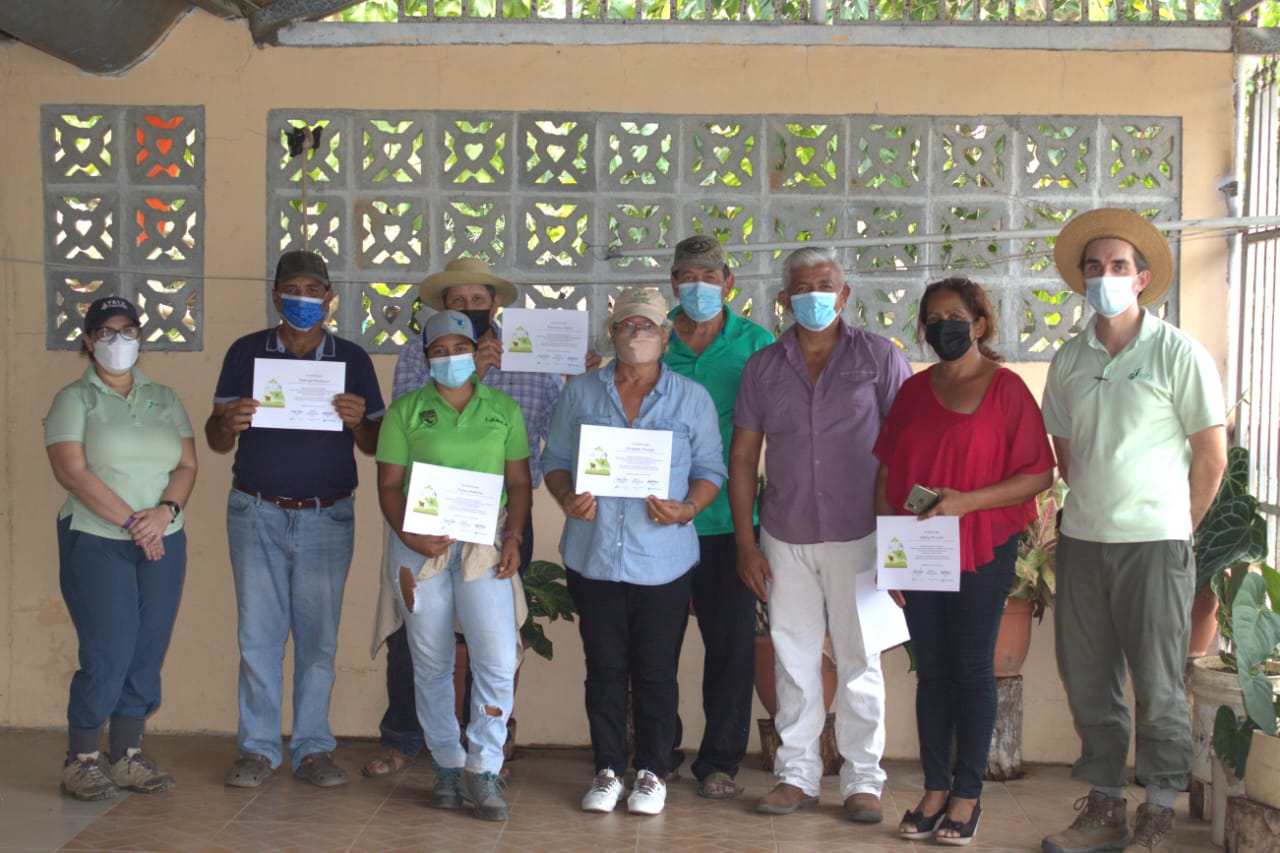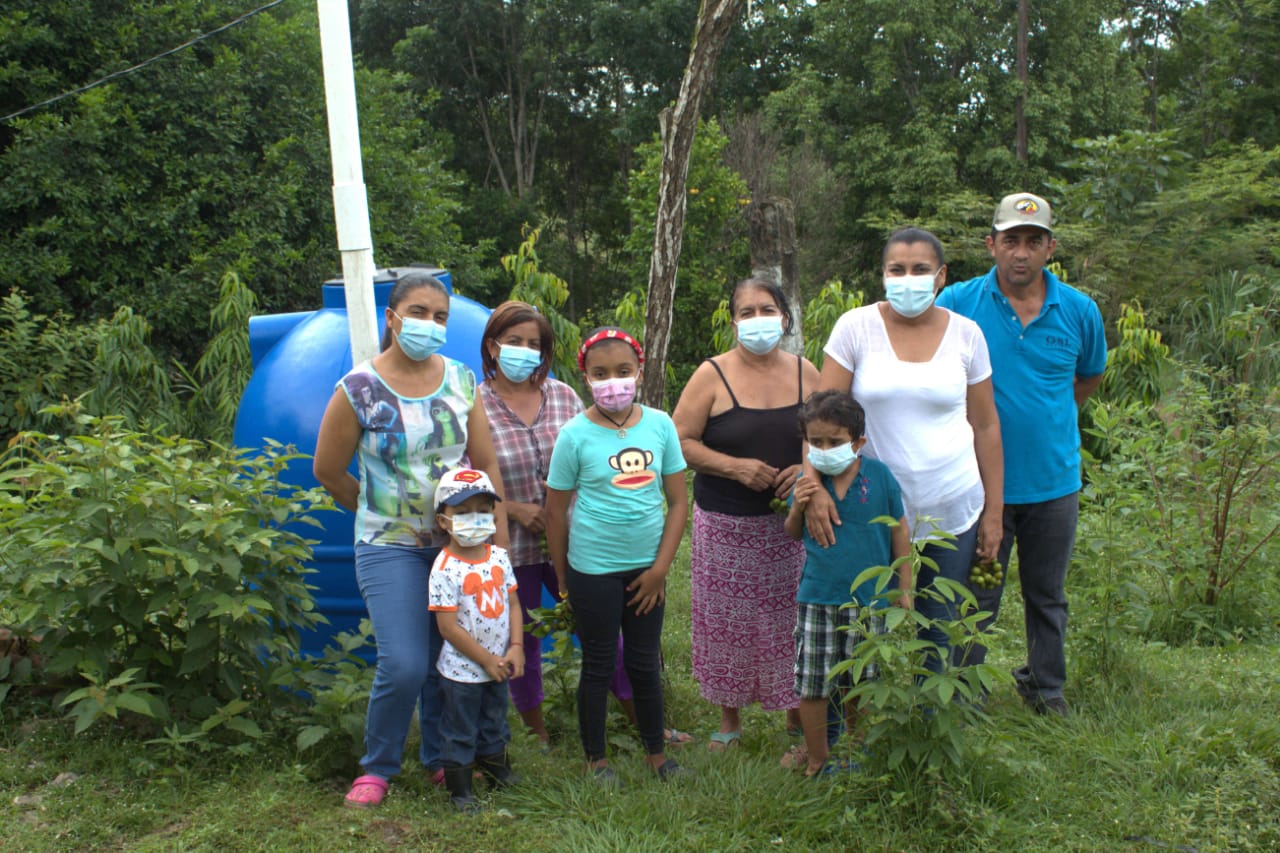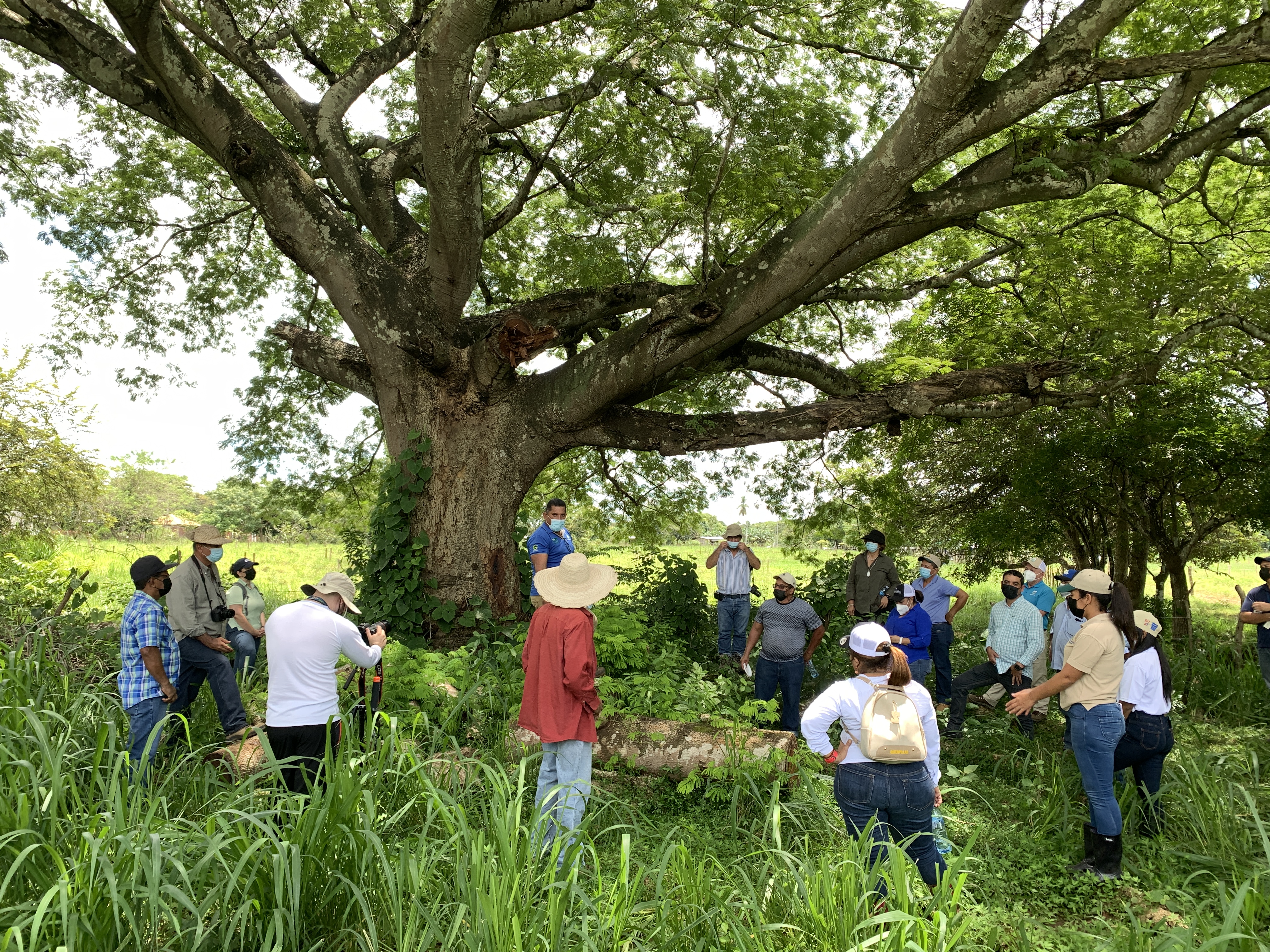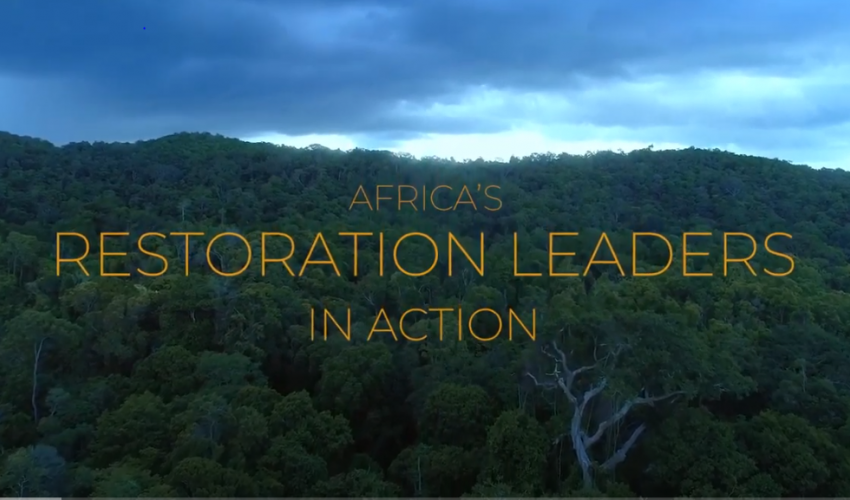News
We are honored when ELTI's work is shared in local and international channels. We also enjoy sharing exciting news about ELTI's programs.
March 14, 2023 | Yale School of the Environment
A new $3 million grant from Arcadia will support the Environmental Leadership & Training Initiative to continue to train and empower people from all backgrounds to restore and conserve tropical forest landscapes. This generous support will enable the team to expand the program’s reach by developing new online courses, increasing scholarship support for participants, and advancing the open access Tropical Restoration Library. Arcadia is a charitable foundation that works to protect nature, preserve cultural heritage and promote open access to knowledge.
February 17, 2023 | Agroecossistemas
ELTI's Colombia Coordinator Zoraida Calle co-authored the open-access article “Silvopastoral Systems and Ecological Connectivity in a Grazing Landscape of the Magdalena Medio Region, Colombia,” published in the Brazilian open-access journal Agroecossistemas. This article is a result of a long-term mentorship to ELTI alumnus Mauricio Carvajal, which involved designing and implementing a restoration project with cattle ranchers and developing a case study.
November 9, 2022 | The Food and Land Use Coalition (FOLU) Colombia
ELTI's Colombia Coordinator Zoraida Calle was a contributing author to the open-access document “Guidelines for the transition towards regenerative food systems in Antioquia (English translation),” which provides technical inputs for designing public and corporate policies, is part of the Food and Land Use Coalition’s (FOLU) initiative to achieve sustainable food and land use systems that meet local and global goals in countries around the world. The document was introduced at an event titled “Regeneration: The Path to Climate Resilience,” which took place in Medellín as part of the Antioquia 2022 Climate Emergency International Convention.
November 7, 2022 | ELTI
ELTI's Panama Coordinator Jacob Slusser was interviewed by Roosevelt Ycaza from a weekly radio program “Panamá Productiva (La Exitosa radio station),” to talk about ELTI’s efforts in Panama, and the recent publication of their field guide, Practical Guide to Establish Silvopastoral Systems in the Azuero Peninsula of Panama (English translation).
Jacob described ELTI’s forest restoration successes including ELTI’s capacity development model and long-term support for alumni—to empower them to make positive land use decisions. The conversation went into detail on the development of model silvopastoral farm networks in the Azuero peninsula.
Lastly, Jacob talked about the recently published field guide published by IATTC-ELTI and how it illustrates practical ways that cattle farmers throughout the country can implement more ecological practices. The guide is based on ELTI’s historical success in helping farmers transform conventional farms into sustainable silvopastoral farms by integrating restoration strategies into cattle farms, which enhance—not replace—traditional livelihoods.
October 18, 2022 | Yale School of the Environment
The Yale School of the Environment features ELTI’s Tropical Forest Landscapes program as one of two online certificates leading to immediate impacts for the environment and environmental careers.
October 5, 2022 | CIFOR-ICRAF
Dr. David Neidel, ELTI Asia Advisor, and Dr. Marlito Bande, ELTI alumnus and partner at Visayas State University, were two of 18 authors of a book titled, "Agroforestry: A Primer. Design and Management Principles for People and the Environment," which was recently published by CIFOR-ICRAF. In recent years, agroforestry has been widely promoted as a land use practice that can contribute to climate change adaptation and mitigation, biodiversity conservation, forest & landscape restoration, sustainable agriculture, and other pressing global issues. Agroforestry, however, is more than just adding trees to existing land use practices. Moreover, agroforestry has such a wide variety of forms that it can not be promoted through simple cook book-style recipes. To address the needs of those who are new to the field, this book was designed to provide an easy-to-understand introduction to the basic principles underlying agroforestry and to provide practical guidance on the development of an array of different agroforestry systems.
October 3, 2022 | https://www.ipe.org.br/
ELTI's Brazil team published two articles on the IPÊ website about their 2021–2022 blended course “Environmental and Productive Adaptation in Rural Properties.”
August 1, 2022 | ELTI
In May 2022, Mr. Gutang was awarded a Rainforest Hero Award for his advocacy of Rainforestation—a form of reforestation using native tree species—at the Visayas State University Anniversary Celebration. Mr Gutang established three Rainforestation sites on unproductive private lands in Pilar, Camotes, through Memoranda of Agreement between himself and the landowners. By integrating native trees with fruit trees and coconut palms, Mr. Gutang turned these barren lands into lush, productive farms that prevent soil erosion and landslides during the frequent heavy rains. As a teacher, Mr. Gutang also works tirelessly to promote Rainforestation among local elementary and high school students.
See interview with GMA regional TV network in the Philippines.
July 31, 2022 | ELTI
ELTI's Panama Coordinator Jacob Slusser was interviewed by Panama's TVN television network about the publication of ELTI's silvopastoral system (SPS) establishment guide. Jacob explained that the guide is based on 10+ years of ELTI’s experience in implementing silvopastoral systems with producers and community associations of Panama’s Azuero Peninsula, one of the most deforested and degraded regions of Panama. With more than 20% of Panama's land use being permanent pastures, the guide will be useful for many organizations and producers not only in Azuero but throughout Panama. The guide, published in collaboration with two ELTI affiliates, Jorge Gutierrez and Saskia Santamaria, is an open access guide available on the ELTI website.
Read more about the interview (Spanish): https://www.tvn-2.com/contenido-exclusivo/innovadora-tecnica-aplicando-potreros-azuero_1_1996132.html
July 27, 2022 | https://environment.yale.edu
The new initiative called the Three Cairns Climate Program for the Global South at Yale School of the Environment supports mid-career professionals working on climate solutions. ELTI welcomed 16 environmental leaders as Three Cairns Fellows in its 2022–2023 cohort of the Tropical Forest Landscapes online certificate program.
June 17, 2022 | https://www.facebook.com/Qawarisun
ELTI's Colombia Coordinator Zoraida Calle gave a short interview for an episode of the Qawarisun podcast focusing on agroecology and soil regeneration. The Qawarisun podcast is an initiative of the “Qawarisun Observatory of Water, Agroecology and Food Sovereignty”, an international consortium of Latin-American NGOs focused on agroecology, based in Peru.
The episode is available at: https://www.facebook.com/Qawarisun/videos/438594104383683.
June 10, 2022 | ELTI
ELTI alumni and cattle farmers from Panama’s La Villa River Watershed—the most deforested watershed of the Azuero Peninsula—completed a two-year project titled “Empowering farmers to support livelihoods by restoring ecosystem services in Panama’s La Villa River Watershed,” funded by the Conservation, Food and Health Foundation. ELTI’s Panama team implemented a field training that introduced participants to the range of forest restoration strategies that can be integrated into a farm. As part of the training, ELTI helped participants create a farm plan to prioritize restoration activities. After the training, ELTI’s Panama team visited participants at their farms and provided technical assistance on how to establish model silvopastoral farms—by providing advice on how to divide pastures, develop water systems, and select appropriate tree and shrub species. Finally, ELTI also provided leadership training to help empower farmers to become effective community trainers to promote a sustainable ranching multiplier effect in the region. To celebrate the completion of the project and provide an opportunity for participants to share their experiences, ELTI facilitated a closing ceremony at ELTI alumnus José Samaniego’s model farm. ELTI will continue to provide support to project participants, as well as incorporate the model farms into ELTI’s Panama training landscape to be utilized in training courses and research.

June 2, 2022 | ELTI
ELTI alumni from the Save a Tree Live Better Ecological Producer’s Association (SAVIM) of the Azuero Peninsula—the most dry and degraded region of Panama—completed a two-year rainwater harvesting project funded by the Global Environmental Facility’s Small Grants Programme. During the project, SAVIM collaborated with cattle ranchers and a parent-teacher association of a local primary school (Calabazo Primary School) to establish rainwater harvesting systems for a silvopastoral system, an agroecological garden for the primary school, and a tree nursery for the community. ELTI strives to assist local communities to adapt to climate change challenges such as drought by supporting forest restoration and sustainable water use projects, essential for creating more resilient landscapes. A video illustrating the project can be viewed on ELTI’s YouTube Channel.

ELTI’s Colombia Coordinator Zoraida Calle was featured in a two-minute Earth Day video at Mi farm for Colanta (Colombia’s largest milk cooperative) inviting other producers to consider themselves as “custodians of biodiversity.” The video can be found on Facebook and Instagram.
ELTI recently completed a French-language online course for 25 young African professionals in collaboration with the Food and Agriculture Organization of the United Nations (FAO).
The seven-week course focused on building capacity, knowledge, and networks for forest and landscape restoration in Western and Central Africa. Read more at https://www.fao.org/in-action/forest-landscape-restoration-mechanism/res...
ELTI Colombia Coordinator Zoraida Calle was invited to give an online workshop on “Agroecological Restoration of Cattle Farms” during one of AgroCultura Caribe’s talk shows. AgroCultura Caribe is a weekly talk series on sustainable agriculture with listeners from all over Latin America and is broadcast live through Facebook and YouTube to a Spanish-speaking audience.
Tropical forests in the Philippines have been deforested and degraded over the past century.
ELTI Philippines Coordinator, Joy Compendio, was interviewed to discuss her work in promoting Rainforestation through VSU-ELTI training events. Rainforestation uses native tree species that enhance biodiversity and local livelihoods. Highlights from the interview were published on the Adversity Archive website.
ELTI created a new program video showcasing our four principles of capacity development and how our approach empowers our participants through training courses, leadership support, and access to knowledge and resources.
November 29, 2021 | https://www.sciencedirect.com/book/9780323857291/natural-resource-governance-in-asia
ELTI’s Tropical Forest Landscapes online program alumnus, Neil Konrad D. Binayao III, published a chapter with Catherine C. de Luna and Angela A. Limpiada (ELTI webinar participants) in the book titled Natural Resource Governance in Asia. The chapter is entitled, "Evaluating the rehabilitation potential of Calliandra (Calliandra calothyrsus Meissn.) in degraded areas through landscape function analysis in Manolo Fortich, Bukidnon, Philippines."
Book link: https://www.sciencedirect.com/book/9780323857291/natural-resource-governance-in-asia
Chapter 4 link: https://www.sciencedirect.com/science/article/pii/B9780323857291000104
November 4, 2021 | ELTI
On August 3, ELTI lost a dear friend and colleague with the death of Dr. Arbainsyah (known as “Insya”) due to Covid-19. Insya worked with ELTI in East Kalimantan (Indonesian Borneo) since 2017, first as the Indonesia Program Assistant and then as the Indonesia Program Coordinator. Insya’s loss is truly heartbreaking for us at ELTI. His hard work and dedication will live on as a legacy in both the landscapes that he helped to restore and in the hearts of everyone he trained and mentored along the way.
Please join us in celebrating Insya’s work with ELTI by learning about his training innovations, his work in the field, and the many publications that he developed with partners and colleagues. Link to detailed tribute: https://mailchi.mp/yale/insya_tribute
October 6, 2021 | Science Direct
ELTI’s Director, Dr. Eva Garen, was part of an interdisciplinary team of scholars and practitioners who published the open access article, The political ecology playbook for ecosystem restoration: Principles for effective, equitable, and transformative landscapes. The publication was inspired by a panel session during the 26th Annual Conference of the International Society of Tropical Foresters (ISTF) at the Yale School of the Environment, which highlighted the importance of socio-cultural, political, and economic considerations when designing and implementing ecological restoration interventions. Article link: https://doi.org/10.1016/j.gloenvcha.2021.102320
September 24, 2021 | ELTI
ELTI affiliates in Panama recently attended the closing ceremony for farmers from the Coclé Province who participated in the project: Sustainable Livestock in the Middle and Lower Watersheds of the Santa María River as a Measure of Adaptation to Climate Change. Over the past two years, this project, the largest sustainable cattle ranching project ever implemented in Panama to date, has established 600 hectares of silvopastoral systems with 120 farmers in three provinces of Panama. ELTI along with ELTI’s primary partner in Colombia, the Center for Research on Sustainable Agriculture (CIPAV) were members of a consortium led by the Group for Sustainable Environmental Education and Management (GEMAS) to carry out the project, which was funded by the Adaptation Fund. In 2019 ELTI trained the 120 farmers on silvopastoral systems via their Panama Training Landscape and helped them develop their farm management plans, the first step of the project. For ELTI affiliates, it was inspiring to attend the closing ceremony and witness the results of the project participants such as, Jorge Cedeño, who had converted his conventional pastures into an intensive silvopastoral system and increased the milk production of his dairy farm by 50%. For more information about this project, please visit: https://www.instagram.com/p/CSxOOZlr11D/

September 24, 2021 | Balitek-KSDA
The Indonesian Research & Development Institute for Natural Resource Conservation Technology (BALITEK-KSDA) published a story co-written by ELTI Research Assistant, Sulton Affifudin, in its Vol X, No1, 2021 issue of Suara Samboja (pp. 27-32). The story, written in Indonesian, discusses the potential for harvesting leaves from the Melaleuca cajuputi tree and distilling the essential oils, which are often used for medicinal purposes. ELTI has been working with Balitek-KSDA and other partners in East Kalimantan to strengthen ecotourism and non-timber forest products as alternative livelihood strategies in support of forest restoration for the endemic proboscis monkey. Click here to read the article.
September 24, 2021 | Yale and the World
Working with ELTI's global partners is key to scale up our efforts. In collaboration with IUCN, ELTI facilitated a series of training courses for environmental leaders from Ethiopia, Madagascar and Togo, who are strengthening their technical and leadership skills to become more empowered restoration leaders. This collaboration was recently featured by Yale in the World and Yale’s Africa Initiative.
June 25, 2021 | IUCN
Collaboration with international partners is key to achieve our mission to inspire decision-makers to restore tropical forests. In 2019, ELTI worked with the International Union for Conservation of Nature (IUCN) with support from the German Corporation for International Cooperation (GIZ) and the German Government (BMZ) to deliver a series of "blended" courses. The course series supported 114 environmental leaders from over 60 organizations in Ethiopia, Togo, and Madagascar to achieve forest landscape restoration goals in their countries. Click here to learn more.

June 7, 2021 | Yale School of the Environment
Watch this short video to learn about ELTI’s approach and inspirational results.
June 2, 2021 | Utrecht University
A case study written by ELTI Colombia Coordinator Zoraida Calle, based at CIPAV, is featured in a book that brings together 21 articles written by restoration scientists and practitioners throughout the world. The book showcases insights from researchers and practitioners at the coalface of forest and ecosystem restoration on the greatest opportunities and fundamental challenges that will need to be addressed in different regions during the coming years.
Her article, entitled "Transitioning to Tree-based Grazing Systems in Colombia," explores the benefits of replacing conventional cattle ranching practices with complex silvopastoral systems, the challenges to this approach, and the necessity of integrating the perspectives of landholders. You can read more about the book here and download the full text of book here.
March 3, 2021 | WWF
ELTI hosted a six-day field course for Latin American decision makers whom have been awarded a Russell E. Train Education for Nature (EFN) Reforestation Grant from the World Wildlife Fund (WWF) and will be conducting reforestation projects in their individual communities with the goal of restoring biodiversity and enhancing human wellbeing in degraded forest landscapes. The course, which occurred in December 2019, focused on the social and ecological consequences of forest degradation and demonstrated the importance of community associations in forest restoration.
March 3, 2021 | ELTI
Mushrooms have long been used by humans both as a food source and as a medicinal ingredient. There are many types of mushrooms that can be cultivated. Two of the most common in Indonesia are Straw mushrooms and Oyster mushrooms, although the production and consumption of mushrooms remains quite low. A recent ELTI online course entitled, "Introducing Oyster and Straw Mushroom Cultivation Techniques for Communities Around Oil Palm Plantations" aimed to help local community members in areas surrounding oil palm plantations develop mushroom production as an alternative livelihood.
January 4, 2021 | Mongabay
Mongabay published an article written by ELTI alumnus David Woodbury and ELTI affiliate Arbainsyah about their research on degraded mine sites in East Kalimantan, Indonesia. The article entitled, “Being realistic about coal mine rehabilitation in Indonesia: An ecological perspective,” describes the challenges associated with an Indonesian law that requires mining companies to restore the degraded land to its “original condition,” an unrealistic target. The accepted solution by the Indonesian government to restoring degraded land is ecological rehabilitation. But ecological rehabilitation cannot restore the land to its “original condition,” and this goal may not align with local community interests or with ecological recovery. You can read the Mongabay article here and find the journal article in Land Degradation & Development here, written in collaboration with other researchers at the Yale School of the Environment, Tropenbos Indonesia and the Indonesian Ministry of Forestry and the Environment.
David and Arbainsyah conducted their research around ELTI's training landscape in Indonesia with in-kind support from the ELTI Indonesia Program and Balitek-KSDA.

